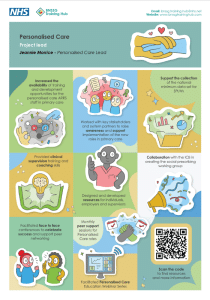Health and Wellbeing Coaches
What is a Health & Wellbeing Coach (HWBC)?
As part of the PCN multidisciplinary team (MDT), health and wellbeing coaches (HWBCs) use their coaching skills to support patients and service users with lower levels of patient activation in becoming active in reaching their self-identified health and wellbeing goals.
As part of their work, HWBCs will:
- Work alongside health, social care, community, and voluntary sector providers and MDTs
- Provide education and specialist expertise to health staff, thereby improving their skills and understanding of personalised care and behavioural approaches
- Raise awareness within a primary care network (PCN) of tools that enable shared decision making (SDM)
HWBCs carry out their role using a non-judgemental approach, supporting patients to self-identify existing issues and encouraging proactive prevention of new illnesses. This approach requires strong communication and negotiation skills, in order to promote personal choice and positive risk-taking, while addressing potential consequences and ensuring patients take accountability for their decisions, chosen based on what matters to them.
NHSE Health and Wellbeing Coaches.
What can Personalised Care roles do within primary care?
The three additional roles under the umbrella of personalised care aim to support people to improve their health and wellbeing, using a holistic approach and considering what matters to that individual. The infographic below shows a board overview of the 3 roles.

What are the benefits?
Health and wellbeing coaches (HWBCs) can support patients in making positive choices for their health and wellbeing; consequently, they can lead healthier lives and will be less likely to require the services of health and care centres, reducing the burden of ill-health in the patient population.
Health and wellbeing coaches (HWBCs) can bring the following benefits to patients and PCNs.
For patients:
- Increased levels of patient activation and of preventative behaviours / self-management
- Overall improvement in health outcomes
- Additional time to address patient goals on an individual level, providing more support for them to pursue their own health goals
- Shown to improve two-way communication and partnership working
For PCNs:
- Increased patient activation can enable fewer visits to general practice, reducing demand for practice services
- Reported increase in job satisfaction amongst healthcare staff
- Less waste on account of unnecessary tests and medication
- Long-term, sustained benefits relating to cost reduction and service development
What is the scope of their practice?
According to NHS England, a HWBC is required to provide one-to-one coaching support for people with one or more long-term conditions, adhering to what is important to them, with the aim of:
- Improving people’s knowledge, confidence and skills-levels of ‘patient activation’
- Empowering people to improve their health outcomes and sense of wellbeing
- Preventing unnecessary reliance on clinical service
- Providing interventions such as self-management education and peer support
- Supporting people to establish and attain self-identified goals
- Working with the social prescribing service to support the triaging of referrals that connect people to the right intervention / community-based activities which support their health and wellbeing
- To work as part of a multidisciplinary, multi-agency team to promote health coaching, and to be ambassadors for personalised care and supported self management, modelling the coaching approach in their work
Is funding available for them?
Health and Wellbeing Coaches are one of the Additional Roles Reimbursement Scheme (ARRS) roles. For further information click here.
Employing a HWBC
Health and Wellbeing Coach Welcome Pack
Health and Wellbeing Recruitment Pack
Workforce Development for HWBCs
Example Induction Checklist Template for Multi-Disciplinary Team Staff in General Practice
Accredited Personalised Care Training
Are there any requirements to receive ARRS funding?
Health and Wellbeing Coaches can be reimbursed via the Additional Roles Reimbursement Scheme (ARRS). However, to be eligible for this funding, there are requirements that SPLWs must adhere to the information outlined in the DES contract.
What clinical supervision do they need?
Having appropriate supervision within the practice and/or PCN is vital. These personalised care roles provide immense support for our patients, however they are often involved with complex and challenging patients. This is rewarding but does require support to ensure this doesn’t become a burden. A clinical supervisor is needed to provide day-to-day support as well as structured clinical supervision, often by way of a monthly review. Day-to-say support could be provided by the on call GP, but having named regular supervisor, often a GP lead is important. Please see this link for further information.
What ongoing support is available for HWBCs?
NHS England & Improvement (NHSE/I) have, in their health and wellbeing coach (HWBC) welcome pack, compiled a list of available support structures and mechanisms — including an online learning community, accessible by contacting england.supportedselfmanagement@nhs.net
NHSE / I Services
Included in their induction guide for social prescribing link workers (SPLWs), NHS England & NHS Improvement (NHSE / I) have compiled a list of ongoing support and resources, including:
- Online health and wellbeing coach learning
- National ‘share and learn’ lessons
- Learning, developmental, and peer support
- Online collaboration
Personalised Care Institute
The Personalised Care Institute has a range of FREE training, resources, and podcasts available for health and wellbeing coaches (HWBC).
To find out more, please click here.
The South West Health Coaching Collaborative – Personalised Conversations and Health Coaching Skills Foundation course Personalised Conversations and Health Coaching Skills (Foundation) Course – 8th, 15th, 22nd October and 5th November 2025 | South West Health Coaching Collaborative | Courses and Events | Learning and Development Centre
Training
NEW Community Health and Wellbeing Worker Level 3 Apprenticeship – City of Bristol College
This option is ideal for people in roles such as Social Prescribing Link Worker, Care Coordinator, Health Coaches as a Level 3 training option available to them in line with the Network DES recommendations : Additionally, where the Social Prescribing Link Worker does not already have any level 3 qualification (e.g. A level or other equivalent post-16 education), the PCN should ensure that they are enrolled in or, undertaking, appropriate training or an apprenticeship to obtain a level 3 occupational standard, accredited by the Personalised Care Institute for social prescribing link workers with consideration given to the Workforce Development Framework for Social Prescribing Link Workers
72. For those workers who already have a qualification at level 3, a level 3 social prescribing course is recommended but not mandatory.
Further Resources
Leadership for Personalised Care.
PCN Personalised Care Reference Guide.
BNSSG Training Hub – Training Matrix for Personalised Care staff.
NHSE – Shared decision making.
What is trauma informed practice?

